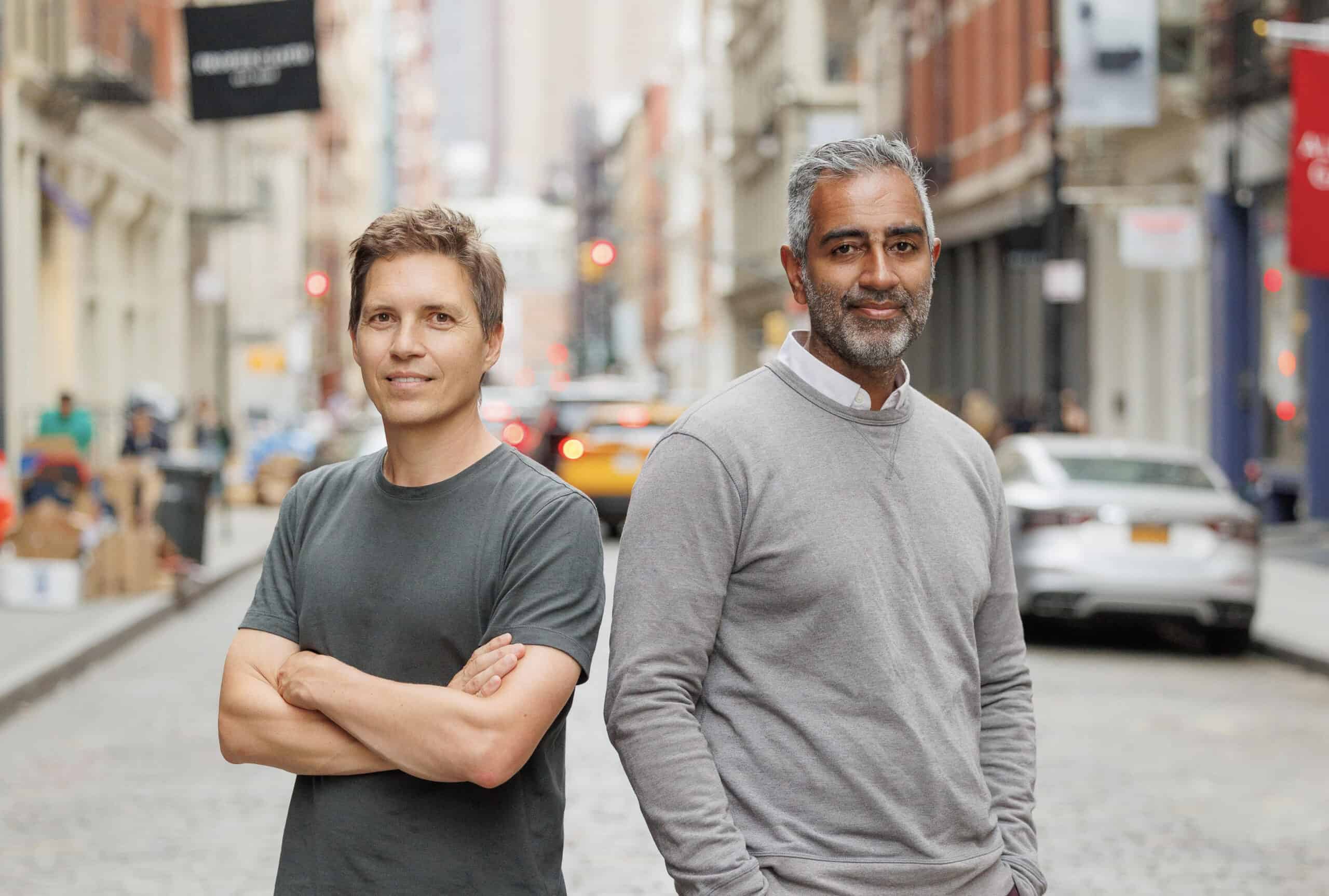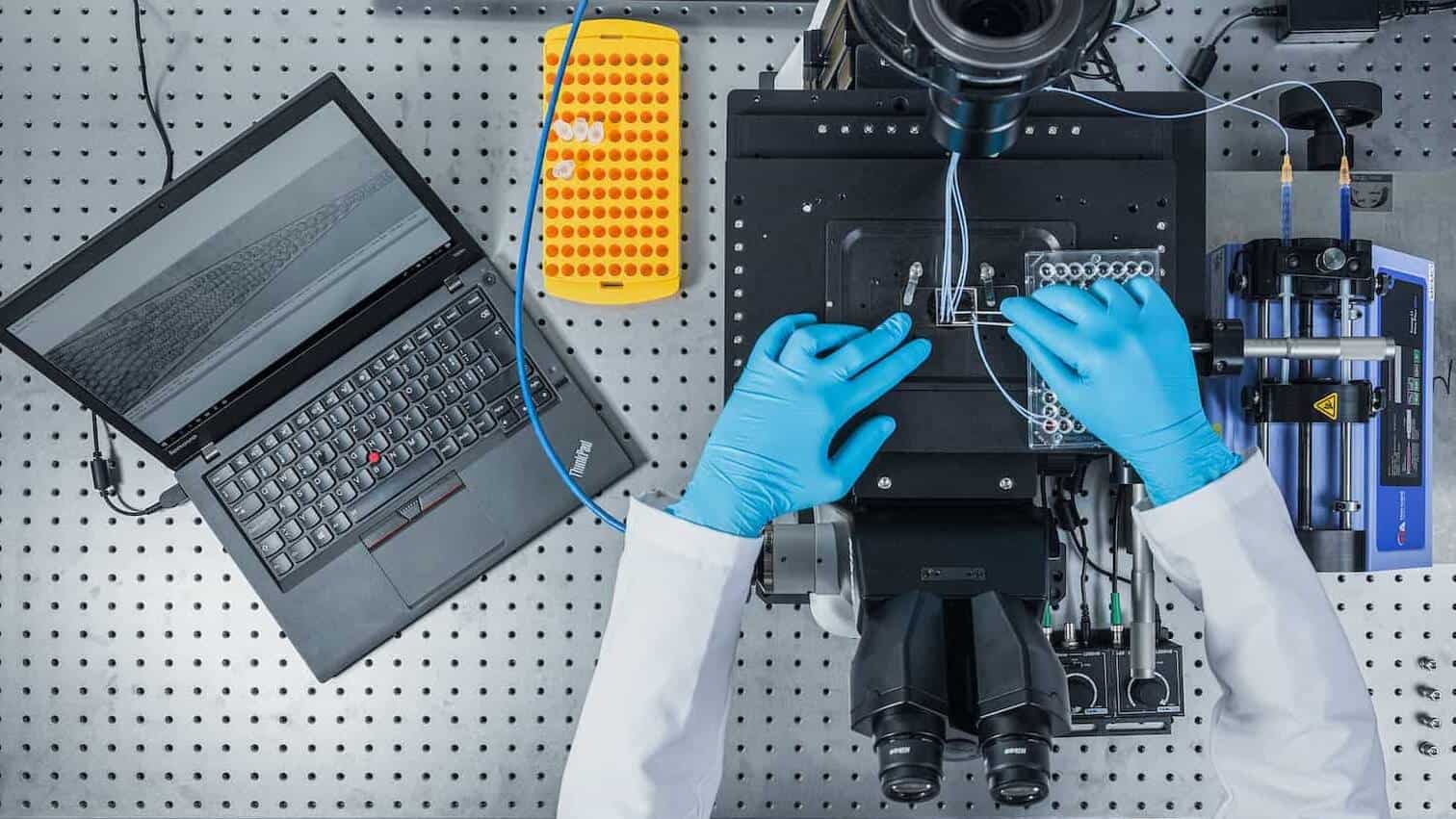Three-time founder turned venture capitalist Iñaki Berenguer now invests in extending the lives of people and the planet. In this interview, he shares lessons for engineers who want to become entrepreneurs, what he learned from over 100 angel investments, and his reasons for co-investing with Verve Ventures in EPFL spin-off Limula.

Co-founder, LifeX Ventures (pictured left)
Iñaki co-founded the venture capital firm LifeX Ventures with Amol Sarva (pictured right) in 2022. Their first fund has a size of USD 100m.
Previously, Iñaki founded Pixable, which was acquired in 2012 for USD 30m; Contactive, which Fuze acquired; and CoverWallet, which raised USD 60M, reached over 500 employees and close to USD 1bn in premium revenue and was acquired by Aon in 2020. He has worked at McKinsey & Company and Microsoft Corporate Strategy. He is a Crown Fellow of the think-tank the Aspen Institute and has personally invested in over 100 startups, co-founding Agentero and iPronics.
Iñaki’s academic journey is equally impressive. He holds Master’s and Ph.D. degrees in Engineering from the prestigious University of Cambridge, an MBA from MIT, and was a two-year Fulbright Scholar at Columbia University. He further honed his skills as a postdoc at the Cambridge-MIT Institute.
You have a Ph.D. in engineering and founded and sold three successful companies. What do technical founders need to succeed in business?
First, you need an entrepreneurial role model. For me, it was Andy Hopper. He led the Computer Laboratory at Cambridge. Andy co-founded numerous companies, one of which was a predecessor to the semiconductor company ARM. He inspired me to become an entrepreneur. The challenge for an engineer is that many topics like finance and accounting, sales, or contract negotiations sound scary. The good news is that you don’t have to be a Renaissance man to start a business and don’t need to know everything about it. You need to harness your self-awareness, understand your weaknesses, and recruit people who excel in those areas. Entrepreneurship is like soccer, not tennis.
What about the risk appetite needed to start a business?
I grew up in a small town in Spain. Starting a business there usually meant mortgaging your house to raise the needed funds. You can imagine what would happen if your business fails. These days, as an engineer, you don’t have to be rich if you want to build a company. If you are solving a relevant problem, venture capital firms will give you the money you need. And VCs understand that you can fail and lose their investment. That does not mean, however, that you won’t have to put in much effort and time, working several years without fair compensation with the risk that your company will eventually fail. This is why you need a lot of inspiration and grit. Entrepreneurship is like running a marathon but without a finish line in sight. Teaming up with VC investors means you can’t be greedy as an entrepreneur. You share the cake and end up with a small piece, but that’s fine if it is significant. Take the example of Prof Bob Langer, the cofounder of Moderna. At the IPO of Moderna, he only held a small percentage of the company’s shares. Nonetheless, this was enough to make him a billionaire eventually.
How can one know if a good idea based on scientific research will eventually turn into a successful business?
You need to discern different types of risks. The first to mention is the technological or scientific risk. This simply means: does it work or not? If you come up with a molecule that has a specific efficacy in mice, you will, at some point, have to try to see if it has the same efficacy in humans. If it doesn’t, well, that’s a scientific risk.
The second is engineering risk. You are building a solution and predict it will take around a year to complete and launch the product. You stumble on a roadblock in executing your plan and need to find solutions to circumvent it, and this whole orchestration prolongs the market launch for five years.
The third is market risk. Here, the question is whether you find enough customers willing to pay a price for your product that solves their problems. Often, engineers don’t pay enough attention to this risk. They need to understand potential customers’ willingness to pay and the alternatives to the product early on. Is this a painkiller or a vitamin? A product that is simply 10% better than the competition isn’t good enough. It has to be significantly better, cheaper, or faster.
As an investor, you must know which risk you take from these three. And usually, you don’t want to take all three simultaneously.
Before you launched LifeX Ventures, you were a prolific angel investor. What are your key takeaways from this time?
When you go to a private bank, they tell you to allocate your wealth to public equities and bonds, real estate, and private markets. However, if you want to make direct investments in startups, there are several things to consider. First, you need to make sure to see a lot of good opportunities to develop some benchmarks and mental models. I was plugged into the entrepreneurial ecosystem and invested in many companies where I knew the founders personally. Second, you need to diversify and invest in a large number of different companies, at least ten or so, because more than 30% of startups fail. You cannot just make one or two investments. And you need to spread your investments over several years to avoid investing at the wrong time of any macroeconomic cycle. I usually co-invested mainly in financing rounds led by professional venture capital firms, so the valuation was also set by professionals and I could piggyback on their judgment. This allowed me to avoid the basic mistakes many investors make when investing in startups independently. I got lucky, knowing the right people and investing at the right time. My second investment later became a 5 billion dollar IPO.

Invest in Startups
As one of Europe’s most active venture capital investors, we grant qualified private investors access to top-tier European startups. With investments starting at EUR/CHF 10’000, you can build your own tailored portfolio over time and diversify across stages and sectors.
You launched LifeX Ventures in 2022. The company’s tagline is “Life extension for people and planet,” which sounds snazzy, but what is its investment hypothesis?
Amol Sarva and I, who founded the firm together, believe that we’re at an inflection point right now and that the application of artificial intelligence to healthcare will have tremendous effects over the coming years. In the past three decades, the cost of innovation has significantly lowered due to software. If you think about everything you had to do in 1995 to set up an e-commerce shop – buying servers, programming all different aspects of the webshop, including payment – and the ease with which the same can be done today thanks to Shopify, Stripe and AWS, the change becomes apparent. Everyone with an internet connection worldwide can contribute to innovation. We think that biotechnology will also be able to innovate much faster and at a lower cost for everyone’s benefit. Once the cost of innovation declines in this field, this will also mean new therapies for rare diseases that weren’t addressed before because there were simply insufficient patients to justify an investment of hundreds of millions. When we look at longevity, we must ask why people die today. The answers are neurodegenerative diseases, cardiovascular diseases, and cancer. With the pace of innovation accelerating thanks to artificial intelligence and software, more bio startups and more experiments will happen, and we will converge faster and cheaper to find the right cures. If we can cure such diseases, people will live longer.
How can we achieve that?
It is a question of accessibility. The future is already here; it’s just unevenly distributed. If we take figures from the US, we see that the average life expectancy is increasing. But if you compare the life expectancy of the rich with that of the poor, there is a difference of around ten years. Why is that? Because some therapies are so expensive, they aren’t available to everyone. The same goes for the best doctors and surgeons. Only the wealthy can afford them. If we can leverage AI tools to increase the quality of care, this will benefit a large population. This is the concept of abundance thanks to AI. I took a blood test a few weeks ago. The doctor looked at it and told me everything was alright. This is fine, but he didn’t even compare it to the results of the test I took a year ago to see if there was a trend. Or he did not compare the results with my genome, MRI images, or urine test. Now, I uploaded the pdf of the results to ChatGPT, and it was able to analyze and compare the results even though this model isn’t particularly specialized in health. This is the future, and better therapies, monitoring, and prevention will occur. Software is cheap compared to humans. And with doctors, there can only be one best doctor in a given field. Software and AI can help create an abundance of great healthcare, which is scarce today.
Let’s discuss a concrete investment case, Limula, where LifeX Ventures and Verve Ventures co-invested in the Seed round. What made you excited about Limula?
We’re market-driven when we invest and like investing in markets with significant tailwinds, not headwinds. The market for Limula’s product, namely the cell and gene therapy market, already exists and is expanding rapidly. Scientific progress in cell therapy has been much faster than the innovation in the production tools needed for cell therapy. There are amazing new cell therapies, many of which are in clinical trials, that will cure lethal cancers or other diseases. But how they are manufactured is like baking a cake in the oven for a month, and you get only one dose for one patient. With one expensive oven, you can only bake 12 cakes a year, so cell therapies are still so expensive and can only benefit a few thousand patients a year. Last year, over one million people could have benefited, but less than five thousand received a treatment because one therapy for one patient can cost over half a million dollars. The founders of Limula have found a way to make the production process ten times less expensive and scale it up. That is why we were excited; it is a clear market need in a big market.
Limula’s device is still under construction, so there is an engineering risk. What convinced you that they could pull it off?
Everyone has a dream, but Limula’s founders have a dream with a clear plan. With their backgrounds from EPFL and the talent they have attracted, they can execute that plan. They have a diverse team that has worked on similar projects. They have some adjacent competition right now, but the market is so big that this will not be a winner-takes-all market. There will be several companies offering products for this market in 10 years and many of them will be huge. I don’t have a crystal ball, but Limula has a good chance of success. And the potential prize is so big that the investment has a pretty good risk-return profile.
Tying this back to your investment hypothesis and outlook for the future: Do you consider yourself a techno-optimist?
If we think about the future, in an optimistic scenario, we can leverage technology to solve many problems. I always laugh when I read a headline about how robots or AI will take our jobs away. AI will bring an abundance of the best healthcare, the best education, and the best of everything. AI is going to unlock human potential and drive prosperity.
Written by
WITH US, YOU CANCO-INVEST IN DEEP TECH STARTUPS

Verve's investor network
With annual investments of EUR 60-70 mio, we belong to the top 10% most active startup investors in Europe. We therefore get you into competitive financing rounds alongside other world-class venture capital funds.
We empower you to build your individual portfolio.
More News
02.04.2024
“Geography unites innovators”
Local proximity still matters, argues Julie Wagner, who devoted her career to the study of innovation districts. Even after the pandemic and amid technological advancements, she explains how select urban geographies are transforming research into a vibrant economy.
19.03.2024
“Biotech is a wonderfully complex industry”
Industry veteran Erik van den Berg joined Verve’s portfolio company Memo Therapeutics right after it raised CHF 25 million in late 2023. The Company is now at a very exciting stage in its development, as he explains in our interview.
10.02.2022
“This breakthrough gives hope to many”
For the first time in history, patients with complete spinal cord injury were able to walk again. ONWARD will make this technology available to patients in the coming years. CEO Dave Marver explains what this scientific achievement means for the company.
Startups,Innovation andVenture Capital
Sign up to receive our weekly newsletter and learn about investing in technologies that are changing the world.




